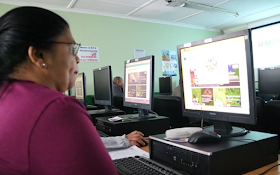SchoolNet SA recently offered five introductory #YouthSpark computer science workshops to teachers from schools in the Western Cape, facilitated by Charmaine Roynon - an educational consultant with a passion for getting teachers using digital tools to enhance teaching and learning. The aim of these workshops was to equip teachers with the knowledge and skills to introduce learners to basic coding using free tools and resources. The courses were widely advertised on SchoolNet SA social media, and teachers from under-resourced schools were invited to attend one of the Saturday sessions.
A highlight of the workshops was experiencing an “Hour of Code” whilst working through the Minecraft themed tutorials. For many teachers, this was their first opportunity to try coding, and according to their facilitator, Charmaine Roynon “Some found it challenging until they grasped what to do and then there was no stopping them!”. Once getting to the end of the tutorial, participants shared their “Hour of Code” certificates on social media to let their friends and colleagues know that they had mastered basic coding.
Many of the teachers who attended these workshops were a bit nervous about coding, with few having tried coding before. Nonetheless, they participated enthusiastically and left with a range of YouthSpark resources, computational thinking resources and some ideas for running “unplugged” activities that teach basic coding skills. We look forward to hearing how the teachers who attended these sessions use some of these resources to give their learners a taste of computer science. If you missed the face-to-face workshops but are keen to introduce your learners to basic computer science, complete the online courses mentioned in this post and explore the tools on your own.
The first of these workshops took place at Portia Primary School in Landsdowne on 4th of August 2018. This school was suggested to us by Gail Valentyn of the Metro Central Education District as a school that had access to computers, and passionate staff who would be interested in attending a workshop. Not only did teachers from Portia attend, but teachers from neighbouring schools also joined the session.
Charmaine reported that some of the teachers found the Hour of Code Minecraft activity challenging. "I let them struggle with minimum input from me. It was great to see how they helped each other. Once they had achieved success, they agreed that it is good to let children struggle and persevere as well as help each other."
In our efforts to take YouthSpark training to underserved areas, the next two workshops took place on 11 and 18 August 2018 at the I Can Centre in Elsies River. This well-resourced community centre caters to the IT needs of people in the area and offers a range of courses to upskill people to use digital tools. The second two workshops took place at the Cape Town Science Centre in Observatory on 25 August and 1 September 2018. The Cape Town Science Centre is a world of discovery under one roof. It also hosts a Microsoft Classroom of the Future – an interactive, hands-on discovery area - and a fully equipped Microsoft IT Centre.
All workshops followed a similar program, beginning with an introductory video clip on computational thinking and a discussion about why it is worth introducing learners to coding - even if, or especially if, information Technology or Computer Applications Technology are not offered as school subjects. Teachers then learnt more about the four cornerstones of computational thinking, namely, decomposition, pattern recognition, abstraction and algorithmic design as well as the benefits of coding.
To encourage teachers to carry on learning after the workshops, participants registered on the Microsoft Educator Community and explored the various courses and resources on offer. In particular, teachers were encouraged to bookmark the Computational Thinking and Facilitating an Hour of Code courses so that they would be able to earn their badges for completing these courses.
A highlight of the workshops was experiencing an “Hour of Code” whilst working through the Minecraft themed tutorials. For many teachers, this was their first opportunity to try coding, and according to their facilitator, Charmaine Roynon “Some found it challenging until they grasped what to do and then there was no stopping them!”. Once getting to the end of the tutorial, participants shared their “Hour of Code” certificates on social media to let their friends and colleagues know that they had mastered basic coding.
After lunch participants learnt more about Physical Computing and explored coding using the virtual Microbit. All teachers were able to complete the Getting Started levels and according to Charmaine “they were really getting the hang of coding and proceeded to tackle some of the tasks in the project section. It was most gratifying to see how the confidence grew in such a short space of time”.
The day ended with participants earning badges on the Microsoft Educator Community for “Getting to know Minecraft” and the “Computer Science Deep Dive”, and with more than 1 000 points each, all left as Microsoft Innovative Educators.









No comments:
Post a Comment